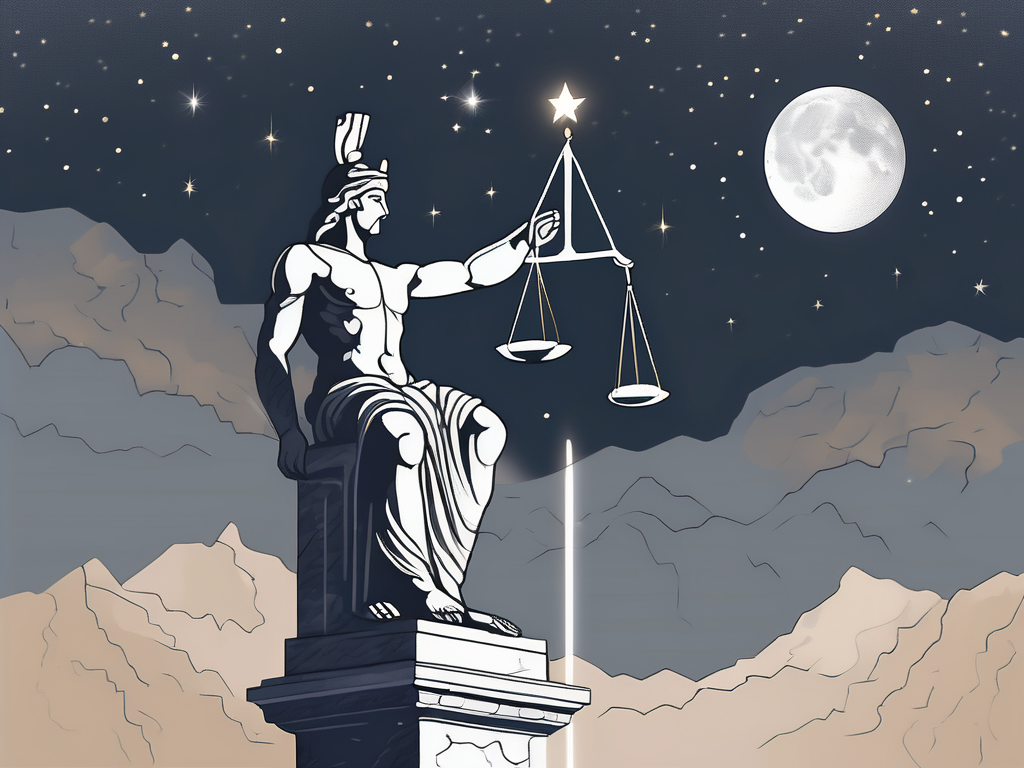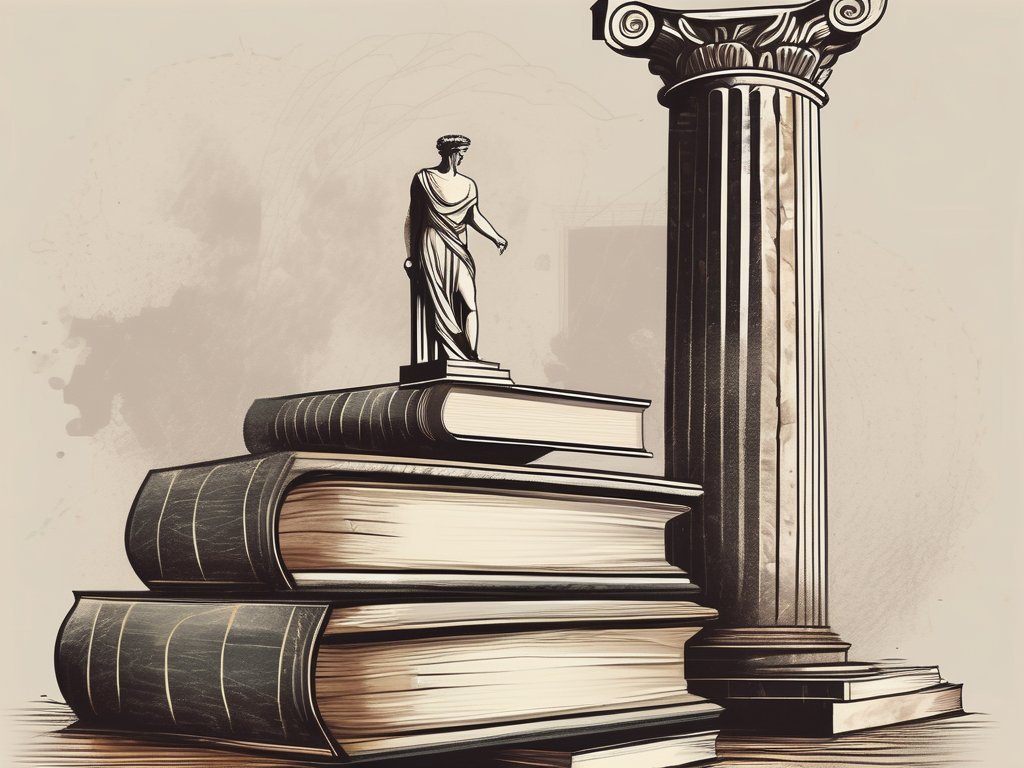Stoicism, an ancient philosophy that emphasizes personal virtue and resilience, has long been associated with deep philosophical contemplation and spiritual beliefs. Within Stoicism, the concept of God plays a crucial role, shaping the worldview of its followers and offering guidance on how to navigate life’s challenges. In this article, we will delve into the intricate relationship between Stoicism and God, exploring the roots of this connection, the different perspectives on divinity, and how Stoic beliefs continue to resonate in the modern world.
Understanding Stoicism: A Brief Overview
To grasp the relationship between Stoicism and God, it is essential to have a basic understanding of Stoic philosophy. Stoicism originated in ancient Greece and later expanded throughout the Roman Empire, attracting a diverse range of followers. At its core, Stoicism promotes the idea that individuals should cultivate virtues such as wisdom, courage, and justice, as this is the key to leading a fulfilling life.
Stoicism, with its roots in ancient Greece, has a rich and fascinating history. It was founded by Zeno of Citium in the early 3rd century BCE and gained popularity among the intellectual elite of the time. As it spread throughout the Roman Empire, Stoicism attracted followers from various walks of life, including politicians, soldiers, and philosophers. Its practical approach to life’s challenges made it appealing to many, as it offered a way to find tranquility and contentment in the face of adversity.
The Core Principles of Stoicism
The principles of Stoicism revolve around accepting what is within our control and letting go of what is not. Stoics believe that external circumstances are beyond our influence, but our inner reactions and attitudes are within our power to regulate. By aligning our actions with reason and embracing the virtue of acceptance, Stoics aim to achieve tranquility and personal growth.
One of the key principles of Stoicism is the concept of “Amor Fati,” which translates to “love of fate.” This principle encourages individuals to embrace and accept whatever life throws their way, whether it be joy or sorrow, success or failure. Stoics believe that by fully accepting and embracing the present moment, we can find peace and happiness, regardless of external circumstances.
Another important principle of Stoicism is the distinction between things that are within our control and things that are not. According to Stoic philosophy, we have control over our thoughts, emotions, and actions. However, external events, other people’s opinions, and the natural order of the universe are beyond our control. Stoics emphasize the importance of focusing on what we can control and letting go of the rest, as this leads to a more balanced and fulfilling life.
The Role of Virtue in Stoicism
Virtue holds great significance in Stoicism and forms the foundation of this philosophical framework. Stoics believe that the ultimate aim in life is to live virtuously, guided by wisdom, courage, justice, and temperance. Virtuous actions are considered to be in harmony with the natural order of the universe, leading to a life of inner peace and fulfillment.
Wisdom, one of the core virtues in Stoicism, involves seeking knowledge and understanding of the world around us. It is through wisdom that we can make rational decisions and navigate life’s challenges with clarity and insight. Courage, on the other hand, is the virtue that enables us to face adversity and overcome our fears. Stoics believe that true courage lies in the ability to endure hardships and maintain a sense of inner strength and resilience.
Justice, another key virtue, involves treating others with fairness and respect. Stoics believe in the inherent equality of all human beings and emphasize the importance of acting justly in all our interactions. Finally, temperance is the virtue that governs our desires and impulses. Stoics advocate for moderation and self-control, as excessive indulgence or attachment to material possessions can lead to discontentment and inner turmoil.
By cultivating these virtues and aligning our actions with reason, Stoics believe that we can live a life of virtue and achieve a state of tranquility and personal growth. Stoicism offers a practical and philosophical framework for navigating the complexities of life, providing individuals with a roadmap to finding inner peace and fulfillment.
The Concept of God in Different Religions
As we explore the relationship between Stoicism and God, it is crucial to examine how different religions encompass the idea of divinity. Various religious traditions have diverse perspectives on the nature and existence of God. Let’s take a closer look at how monotheism and polytheism view the divine.
Monotheistic Perspectives
In monotheistic religions such as Judaism, Christianity, and Islam, the focus is on the belief in a single, all-powerful God. This God is seen as the creator and sustainer of the universe, embodying qualities such as love, mercy, and justice. Monotheistic traditions often emphasize a personal relationship with God and encourage individuals to seek guidance and find solace in the divine.
Within monotheism, there are further variations in the understanding of God. For example, in Christianity, God is believed to be a Trinity, consisting of the Father, Son, and Holy Spirit. This concept of the Trinity adds another layer of complexity to the understanding of God’s nature and relationship with humanity.
In Islam, God is seen as transcendent and beyond human comprehension. Muslims believe in the oneness of God, known as Tawhid, and strive to establish a direct connection with the divine through prayer, fasting, and acts of worship.
Judaism, on the other hand, places a strong emphasis on the covenant between God and the Jewish people. The relationship between God and humanity is characterized by a mutual commitment, with both parties having responsibilities and obligations towards each other.
Polytheistic Views
Conversely, polytheistic religions such as ancient Greek and Roman mythology encompass the belief in multiple deities. Each deity possesses different powers and attributes, governing various aspects of life. Polytheism acknowledges the complexity of human experiences and offers a more diverse range of divine entities to seek guidance from.
In ancient Greek mythology, for example, Zeus is the king of the gods and the ruler of the sky and thunder, while Athena is the goddess of wisdom and warfare. These deities are not seen as all-powerful, but rather as beings with their own strengths and weaknesses.
Polytheistic religions often involve rituals and ceremonies dedicated to specific deities, seeking their favor and protection. These rituals can vary greatly depending on the culture and time period, but they serve as a way for individuals to connect with the divine and seek guidance in their lives.
It is important to note that while monotheistic and polytheistic religions have different perspectives on the concept of God, they both provide frameworks for individuals to explore and understand the divine. The diversity of religious beliefs and practices enriches human experiences and allows for a deeper exploration of spirituality.
Stoicism and God: A Historical Perspective
When exploring the relationship between Stoicism and God, it is crucial to delve into the historical development of Stoic thought and its evolving perspectives on divinity.
Stoicism, a philosophical school that originated in ancient Greece, has had a profound impact on Western thought. Its teachings on ethics, virtue, and the nature of the universe have captivated the minds of many throughout history. Central to Stoic philosophy is the concept of God, which has undergone significant transformations over time.
Early Stoic Philosophers on Divinity
In its early stages, Stoic philosophy aligned divinity with the natural world. Early Stoic philosophers viewed God as synonymous with nature or the rational governing principle permeating the universe. They believed that the universe operates according to an inherent order, and by aligning oneself with this order, one can attain virtue and fulfillment.
These early Stoics saw divinity as an immanent force, present in every aspect of existence. They believed that by observing and understanding the natural world, one could gain insights into the divine. For them, the study of nature was a spiritual practice, a means of connecting with the divine essence that permeated all things.
Furthermore, these early Stoic philosophers emphasized the importance of living in accordance with nature. They believed that by embracing the rationality and orderliness of the universe, individuals could cultivate wisdom, tranquility, and inner peace. By aligning their actions with the divine will, they sought to live a virtuous life.
Evolution of Stoic Thoughts on God
As Stoic philosophy evolved, so did its ideas about God. Later Stoic thinkers began to emphasize the role of Providence, believing that God not only created the universe but also actively governs and orchestrates its unfolding events. They posited that everything that occurs serves a purpose within the grand design of the universe, contributing to the harmonious interplay of fate and individual agency.
According to these later Stoics, Providence ensures that everything unfolds according to a divine plan. While individuals possess free will and the ability to make choices, these choices are ultimately guided by the divine will. The interplay between fate and individual agency became a central theme in Stoic thought, with the belief that individuals should accept their fate and strive to live virtuously within the constraints of the universe’s design.
This evolving perspective on God in Stoicism reflects the philosophical and cultural changes that occurred over time. As Stoicism spread throughout the Roman Empire, it encountered new ideas and influences, leading to the development of more complex and nuanced understandings of divinity.
It is important to note that Stoicism does not advocate for a personal, anthropomorphic deity. Instead, it emphasizes a more abstract and impersonal concept of God, one that is closely intertwined with the natural world and the rational order of the universe.
In conclusion, the relationship between Stoicism and God is a fascinating subject that has evolved over time. From the early Stoic philosophers’ view of divinity as synonymous with nature to the later emphasis on Providence and the interplay of fate and individual agency, Stoicism offers a unique perspective on the nature of the divine. Exploring these historical developments allows us to gain a deeper understanding of the rich philosophical tradition of Stoicism and its enduring relevance in today’s world.
The Intersection of Stoicism and Theism
Within the context of Stoicism, the concept of God intersects with several key aspects of philosophy, shaping its ethical framework and providing a deeper understanding of the human experience.
Stoic Views on God’s Nature
Stoics perceive God as a benevolent entity, embodying wisdom and rationality. By aligning their thoughts and actions with these divine attributes, individuals can cultivate virtue and live in accordance with nature. Stoic teachings encourage followers to trust in the inherent goodness of the universe, even in the face of adversity, and to seek wisdom through introspection and the pursuit of philosophical truths.
The Role of Fate and Providence in Stoicism
Fate and Providence play significant roles within Stoic philosophy. Stoics believe that the universe operates according to a predetermined plan and that events unfold under the guidance of divine Providence. While individuals possess free will and must act virtuously, they must also accept and adapt to the circumstances presented to them, recognizing that everything that transpires is interconnected and serves as a lesson or an opportunity for growth.
Stoicism in the Modern World: A Spiritual Perspective
Although Stoicism originated in ancient times, its principles continue to hold relevance in the contemporary world, resonating with individuals seeking spiritual guidance and personal growth.
Applying Stoic Principles in Contemporary Spirituality
Stoicism offers valuable insights and techniques for navigating the complexities of modern life. Its emphasis on self-reflection, virtue ethics, and acceptance can be integrated into various spiritual practices to promote inner peace, resilience, and personal development. By adopting Stoic principles, individuals can cultivate a deeper sense of meaning, find solace in difficult times, and foster a greater connection with the divine.
Stoicism and God in Modern Discourse
The relationship between Stoicism and God continues to be explored and discussed in contemporary discourse. Many individuals who identify as Stoics integrate their spiritual beliefs into their practice, forming a unique blend of philosophy and faith. The dialogue surrounding Stoicism and God offers a rich tapestry of perspectives, provoking contemplation and encouraging individuals to explore their own spiritual journeys.
Conclusion
In conclusion, the relationship between Stoicism and God is both intricate and profound. Stoic philosophy, with its emphasis on virtue, acceptance, and the interconnectedness of the universe, provides a framework for individuals to find meaning and resilience in the face of life’s challenges. Whether through aligning with divine attributes or embracing the guiding principles of Providence, the integration of Stoic beliefs and spiritual perspectives offers followers a path towards personal growth, wisdom, and a deeper understanding of the divine.












